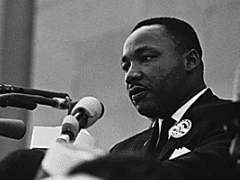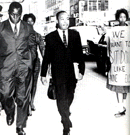|
|

Martin Luther King, Jr.
Part 2: His Life Cut Short
The Southern Christian Leadership Conference, a leading civil rights organization, elected him president in 1957. That year, Congress passed the Civil Rights Act of 1957, the first civil rights law passed since 1875. (A second Civil Rights Act came in 1960, with the most famous ones coming in 1964 and 1965.) From that time forward, King took his case directly to the American people. It is estimated that he traveled more than 6 million miles and spoke more than 2,500 times. He also wrote five books and numerous magazine and newspaper articles during this time.
In 1960, he accepted his father’s offer and became co-pastor of the Ebenezer Baptist Church in Atlanta. He served in that role until his death eight years later.
 One of his famous moments was a speech that he gave in Washington, D.C. On August 28, 1963, he delivered, as part of the 250,000-people strong March on Washington, a famous speech that has come to be called the “I Have a Dream” speech. Later that year, Time magazine named him Man of the Year. One of his famous moments was a speech that he gave in Washington, D.C. On August 28, 1963, he delivered, as part of the 250,000-people strong March on Washington, a famous speech that has come to be called the “I Have a Dream” speech. Later that year, Time magazine named him Man of the Year.
 In 1964, he became the youngest person ever to receive the Nobel Peace Prize. (He was 35.) King promptly announced that he would turn over all of the money he received along with the award ($54,123) to help advance the civil rights movement. When he returned to the U.S. from Norway, where had accepted the Nobel award, he led a nonviolent march to promote voter registration that come to be known as the Selma-to-Montgomery Freedom March. More than 25,000 people took part. In 1964, he became the youngest person ever to receive the Nobel Peace Prize. (He was 35.) King promptly announced that he would turn over all of the money he received along with the award ($54,123) to help advance the civil rights movement. When he returned to the U.S. from Norway, where had accepted the Nobel award, he led a nonviolent march to promote voter registration that come to be known as the Selma-to-Montgomery Freedom March. More than 25,000 people took part.
As famous as he was, Martin Luther King, Jr. was not above or below anyone. What turned out to be his final protest march was a gathering of striking garbage workers in Memphis, Tenn. He was there on April 4, 1968, in order to participate in the protest march the next day, when he was shot dead.
His message of nonviolence was heeded by many and scorned by others. His hope for an America without color lines is still an ongoing pursuit, according to many people. But his name lives on as a symbol of freedom and determination. Just about everywhere you go in the world, you’ll find someone who has heard his name. You can also find his name on street signs and schools around the United States. Right next door to the Ebenezer Baptist Church in Atlanta is the Martin Luther King Jr. Center for Non-Violent Social Change. The Lorraine Hotel, where he was shot, is now the National Civil Rights Museum. And his birthday, January 15, is recognized as a national holiday.
First page > Early Years > Page 1, 2
|
|

 One of his famous moments was a speech that he gave in Washington, D.C. On August 28, 1963, he delivered, as part of the 250,000-people strong March on Washington, a famous speech that has come to be called
One of his famous moments was a speech that he gave in Washington, D.C. On August 28, 1963, he delivered, as part of the 250,000-people strong March on Washington, a famous speech that has come to be called  In 1964, he became the youngest person ever to receive the Nobel Peace Prize. (He was 35.) King promptly announced that he would turn over all of the money he received along with the award ($54,123) to help advance the civil rights movement. When he returned to the U.S. from Norway, where had accepted the Nobel award, he led a nonviolent march to promote voter registration that come to be known as the Selma-to-Montgomery Freedom March. More than 25,000 people took part.
In 1964, he became the youngest person ever to receive the Nobel Peace Prize. (He was 35.) King promptly announced that he would turn over all of the money he received along with the award ($54,123) to help advance the civil rights movement. When he returned to the U.S. from Norway, where had accepted the Nobel award, he led a nonviolent march to promote voter registration that come to be known as the Selma-to-Montgomery Freedom March. More than 25,000 people took part.
